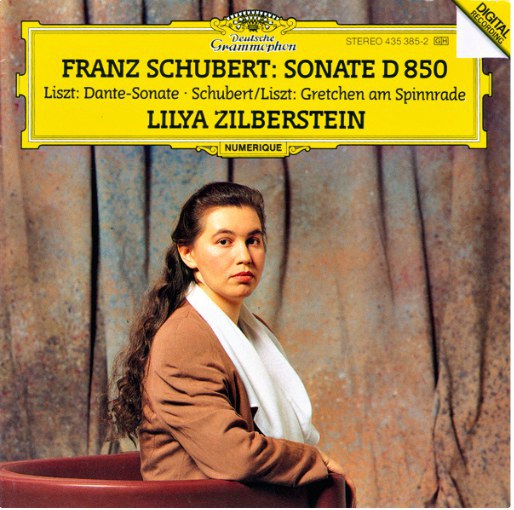Schubert: Sonate D 850 / Liszt: Dante Sonate / Schubert/Liszt: Gretchen am Spinnrade
Douban
overblik
Heir to the great Russian school of technique, Lilya Zilberstein is a noteworthy Muscovite pianist who possesses a great gift of insight and ability as exhibited in this extraordinary 1990 programme recorded in DG's Jesus-Christus-Kirche studio, Berlin.
The recorded sound has much bloom and ambience amid the crystal-clarity of the piano.
Zilberstein begins this remarkable recital with Liszt's solo-piano transcription of Schubert's 1814 breakthrough lied `Gretchen am Spinnrade' (D.118) wherein she takes a marvellously measured deliberate pace at nearly twice the common durée to express Gretchen's painfully yearning physical desire for Faust as she drearily toils at the spinning wheel: in Poe-esque fashion Gretchen bemoans, `I will find my restfulness never nevermore'.
Zilberstein captures Gretchen's smouldering passion in a warm bath of aural eroticism suggesting a suffocating atmosphere of ennui and sexual anxiety.
Next on the programme is Liszt's difficult Dante Sonata--mate to his infamous b-minor Sonata in its appalling poor taste and gaucheness.
Liszt--author of literally `too many notes'--seems to have had a natural instinct for noisome maladroit muck which exploits the keyboard's potential to no end: there's simply no `there' there.
Nevertheless, Zilberstein does the best anyone could with this formidable monstrosity of musical diabolism.
Finally, the programme's peerless pièce de résistance: Schubert's glorious D-major Sonata which Zilberstein correctly sees in relation to the subsequent great G-major Sonata (D.894) and the great C-major Symphony (D.944) in terms of scale and ebullience of expression.
She negociates the metrical shifts of Movement I in a manner positively pregnant with imagination.
In Movement II--by far the longest on record, Zilberstein takes a dreamy diaphanously lyrical approach which results in a Theta-brainwave inducing expansiveness yet with a precisely maintained arc of tempo without even an hint of slackness: here she approaches the artistry of Arrau and Glenn Gould.
Zilberstein brings out the symphonic ambitions of Schubert's stentorian Scherzo-Trio in a quasi-Brucknerian mode complete with a lamby Ländler which too has it leonine face.
Finally, via vision and technique Zilberstein takes the meticulously increasing embroidery of the delicatezza Rondo almost as a set of variations.
tracks
Gretchen am Spinnrade (I & II), transcription for piano (after Schubert, D. 118), S. 558/8 & S. 558bis/8 (LW A42/8)
Années de pèlerinage: 2ème année: Italie, S.161 - Après une lecture du Dante fantasia quasi sonata
Piano Sonata No. 17 in D major ('Gasteiner'), D. 850 (Op. 53): Allegro vivace
Piano Sonata No. 17 in D major ('Gasteiner'), D. 850 (Op. 53): Con moto
Piano Sonata No. 17 in D major ('Gasteiner'), D. 850 (Op. 53): Scherzo & Trio, Allegro vivace
Piano Sonata No. 17 in D major ('Gasteiner'), D. 850 (Op. 53): Rondo, Allegro moderato